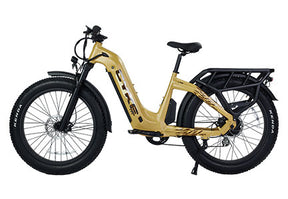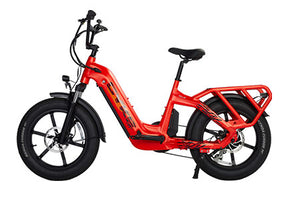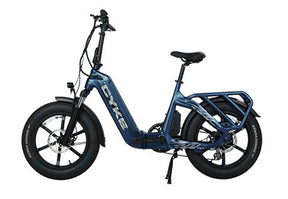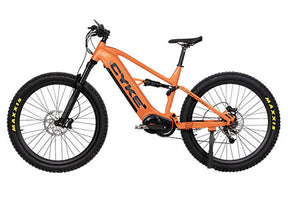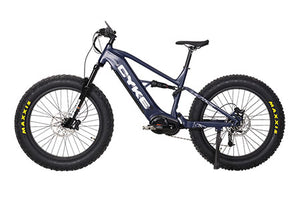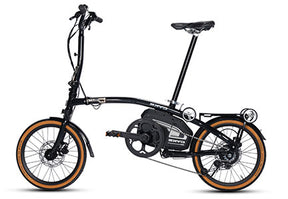Featured in this posts
Aluminum vs. Carbon Fiber Bike Frames: Which is Better?
Are you looking for a comparison between aluminum vs carbon fiber to decide which material will be right for your bike? In that case, you are in the right place. Here we have compared both of these materials, discussed their pros and cons, and even shown examples of some quality e-bikes.
Without any further ado, let’s dive into this guide to learn about aluminum and carbon fiber bike frames in detail.
What are Aluminum Bike Frames?
It’s obvious that an aluminum bike frame means a bike frame made of aluminum alloy. The specialty of this material is that it is lightweight, affordable, strong, and resistant to corrosion.
An aluminum alloy bike frame also offers great stiffness that can provide a responsive ride by enhancing the power transfer so that you can enjoy a great riding experience over a variety of terrain types.
What are Carbon Fiber Bike Frames?
A carbon fiber frame is made by weaving carbon strands in various patterns and then hardening them with resin. Known for its strength-to-weight ratio, carbon fiber makes it possible to create bike frames that are extremely strong and lightweight.
However, this material is more expensive and difficult to repair. Carbon fiber can be more susceptible to damage from impacts as well.
Advantages of Aluminum Alloy Bike Frames
Let’s take a look at some of the core benefits you will get when you go for a bike that has an aluminum alloy frame:
Strength and Durability
Aluminum is naturally corrosion-resistant and endures substantial impacts, which ensures robustness and longevity. This material is also fatigue-resistant as well as repairable. In bikes, 6061 and 7005 aluminum alloys are used, which are strong and make the frame capable of withstanding various riding conditions.
Affordable and Widely Available
Another core advantage of aluminum alloy bike frames is affordability. This material comes with a cost-effective price tag and is widely used in bike industries. Because of the wide level of usability, you can find a wide range of aluminum bike frames to suit different needs and budgets.
Versatility
Aluminum is known for its versatility. It can be used to create frames in a wide range of shapes and sizes, allowing manufacturers to craft frames with varying geometries.
eBikes with Aluminum Frames
Aluminum is one of the most commonly used materials in the bicycle industry because it provides a solid combination of performance and affordability. Have a look at some of the bikes that are made of aluminum frame:
Cheetah Hunting eBike
The Cheetah Hunting ebike is CYKE’s one of the most popular aluminum 6061 series bike with strong durability. With the combination of an aluminum frame and 26x4.0" fat tires, this e-bike is perfect for handling rugged terrains and heavy loads up to 450 lbs. Its long-range battery and powerful motor make it ideal for extended hunting trips, up to 100-mile range per charge.
Falcon S eMTB
The Falcon S eMTB is made with an aluminum mountain bike frame that is designed with an exceptional suspension facility. This one is perfect for taking on difficult trails and off-road excursions because of its 29x3"MTB fat tires, strong 1000W mid-drive motor, and complete 4-bar suspension system. The 6061 aluminum frame ensures efficient power delivery and responsive handling.
Falcon X eMTB
The Falcon X eMTB is a powerful and versatile electric mountain bike built on a durable aluminum alloy frame. Its full suspension system, robust 1000W motor, and aggressive 26x4.8" snow tires make it ideal for conquering challenging terrains, while offering a great riding experience in a variety of road conditions.
Advantages of Carbon Fiber Bike Frames
Carbon fiber is a popular material for bike frames, and many brands, such as Trek, Giant, and Cannondale, frequently use it in their designs. But what makes carbon fiber bike frames so appealing?
Lightweight
Carbon fiber is lighter than other materials like aluminum. Approximately, it’s 30% lighter than aluminum, which is great for improved speed.
Vibration Damping
You will get more comfort while riding a bike made of carbon fiber. The reason is this material can absorb road vibration, which will reduce fatigue-related issues.
Strength and Stiffness
In a bike made of carbon fiber, you will get more recipes and responsive bike handling because of the material’s exceptional strength and stiffness.
Aluminum Alloy vs. Carbon Fiber
By now, you must have a decent knowledge of both bike frame materials. Now we will make a direct comparison of aluminum alloy vs carbon fiber.
Weight
With both materials being lightweight, carbon fiber is lighter than aluminum. Carbon fiber’s unique structure provides a strength-to-weight ratio, which makes the bike lightweight and easy to handle.
Ride Quality
When it comes to ride quality, both offer almost the same level of comfort. But carbon fiber’s natural vibration-damping properties will give you a smoother riding experience on uneven surfaces.
Cost
In terms of cost, aluminum will surely beat carbon fiber. Aluminum is more affordable compared to carbon fiber. And the reason behind carbon fiber’s high pricing is its manufacturing process.
Why Choose an Aluminum Frame?
While carbon fiber does have some advantages when you compare aluminum vs carbon fiber, it’s ideal to go for an aluminum frame, especially a 6061 alloy frame. This material is fairly strong, durable, less expensive, and offers good longevity.
Aluminum is also corrosion resistant and offers an easy repair solution in the occasion of damage issues. Because of having such benefits, aluminum is used in making almost all types of bikes.
Which Bike Frame Material is Right for You?
Now, you can easily decide which bike frame material will be right for you. If you want an affordable, high-performance, and durable bike for all-around use, go for aluminum, especially 6061 alloy bike frames.
On the other hand, if you prefer comfort, speed, and especially lightweight, in the mean time you have a higher budget on the bike, you better invest in carbon fiber.
Conclusion
Since you are here, we believe you can now differentiate the differences between aluminum and carbon fiber materials. We tried to include a detailed aluminum vs carbon fiber guide so that you can get to know both materials properly.
So, weigh your options carefully and select the bike that aligns best with your cycling goals.

